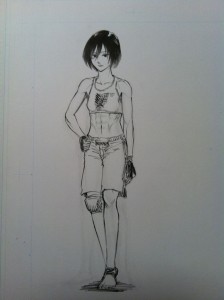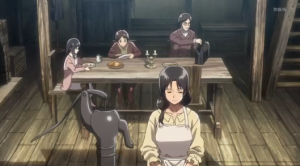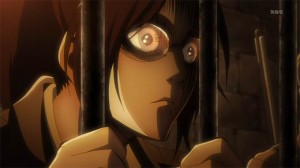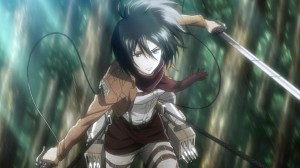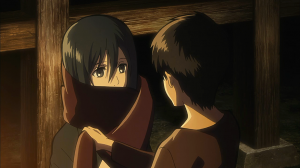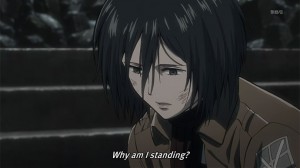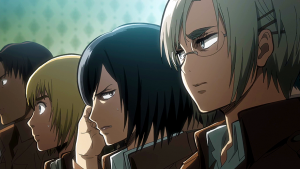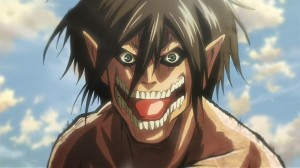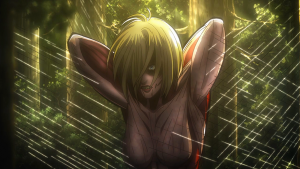Attack on Titan: Mikasa Ackerman is Not a Feminist Heroine
Summary: One hundred years ago, humanity came under attack by enormous, man-eating, humanoid mutants known as “titans.” The few remaining survivors retreated behind tall walls and did their best to live on the limited resources they had left. One hundred years later, the titans have returned, doggedly tearing down the defenses that the humans have worked so hard to build up. But the situation is not hopeless; the military works tirelessly to keep the human race safe, and a fierce young man named Eren Jaeger finds he may hold the key to winning back the world from the titans.
Potential Triggers: Violence, attempted rape
Would I recommend it? Not really, but I’m in the minority here.
Note: This review is based on the anime series (in its entirety, so spoilers abound) and does not take the manga into account.
Attack on Titan has garnered a reputation as a feminist anime, one that I don’t believe is entirely deserved. It’s true that it has many feminist-friendly elements to it, but it is also deeply problematic in many ways. After so much build up, I admit I was disappointed by what it had to offer.
In a perfect world, the feminist-friendly parts of Attack on Titan would barely merit mention. Unfortunately, we live in a highly sexist, imperfect world, so I’ll discuss them anyway. Most of the equitable treatment of women comes from the show being set around the military. Yes, that’s right. In fantasy pseudo-Europe, women are treated more fairly within the military than in most modern-day nations. Their uniforms are identical and the girls are just as capable, physically and mentally, as the boys, if not more so. Male characters, thus far, have been more prone to open displays of extreme emotion. Usually, even in manga that have prominent female characters who are ostensibly on equal ground with the men, they lack physical strength or behave in stereotypically feminine ways, and Attack on Titan has none of that behavior. There hasn’t even been a whiff of fan service – although there is official art of Mikasa baring her midriff, it was drawn in a way to show off her raw physical power, not to titillate.
It is notable that, despite the unusually equal gender distribution among the new recruits and, to a lesser extent, the middle ranks of the military, the upper levels are still completely dominated by men. In the early episodes, when the protagonists are still children, there are no female soldiers to be seen. Furthermore, though we get only a few glimpses into civilian life, those that we do see follow traditional gender roles very strongly. Eren’s father works as a doctor, while his mother cares for the house. Mikasa’s mother teaches her a form of embroidery passed down in the family. It is my understanding that the manga is slightly different, with more visible women in the military even before the timeskip and Mikasa’s mother giving her a clan tattoo. I don’t know why the director Tetsuro Araki decided to make these changes, but considering his poor track record with depicting women, I consider it very suspect.
Equal treatment of women and no objectification isn’t inherently feminist; it’s really the bare minimum that media should be held to, and it’s saddening that it’s uncommon enough that it is celebrated when it occurs. Much more interesting and exciting is that Hange Zoe has been confirmed as nonbinary. It’s been a point of huge contention in the fandom, and I admit that I was skeptical. The lack of gendered pronouns and androgynous character design doesn’t point to much, considering the way pronouns are used in Japanese and the overall quality of Isayama’s art. As far as I know, this is the first example of a truly nonbinary character in a major manga series and, handled correctly and with sensitivity, has the potential to be groundbreaking.
The single biggest point of contention for me in whether or not Attack on Titan can be considered feminist or not is the character Mikasa Ackerman. Mikasa is the physically strongest of the human cast, highly protective of Eren, and a keen strategist. She is also not in any way, shape, or form, a feminist character.
At a glance, she has great potential to be one, and even seems to be. After all, she’s at the top of her training class: their instructor even admits that her combat skills are flawless. She is a keen strategist on top of her physical brilliance, and shows none of the flightiness or over-emotionality that the female segment of the standard shonen trio tends to have, such as Sakura from Naruto or Orihime of Bleach. The idea of Mikasa as the damsel in distress is unthinkable; it’s in fact far easier to conceive of her as the rescuer, since that is the role she is most prone to play.
All that is spoiled by the fact that she has no inner life or emotional depth outside of her extreme devotion to Eren. Despite her brilliance, she is prepared to follow Eren anywhere. When it appeared that Eren was completely incapable of handling the three-dimensional gear and was doomed to wash out and be forced to work the reclaimed land – implied to be little better than a death sentence – Mikasa was entirely prepared to follow him. This wasn’t too off-putting on its own. After all, he had saved her life when they were young, and she had been by his side ever since. That she was devoted, even to the point of self-sacrifice, seemed only natural.
Mikasa’s semi-arc during the Battle of Trost was what clinched her failings as a feminist, or even feminist-friendly character. Up until she hears of Eren’s death, Mikasa shows great leadership throughout the battle: forcing a greedy merchant to move his overloaded cart and let people through, giving inspirational speeches, and so on. When her fuel runs out, Mikasa simply… gives up. Without Eren, she has no will to live. Even when a titan comes to attack, she moves only involuntarily.
I did not find Mikasa’s instinctively dodging the titan’s attacks inspirational or touching. It leads to the realization that she wants to survive, yes, but only so that she can continue to remember Eren. After this, her character arc stalls out. Eren, in titan form, rescues her and is soon revealed to be himself. Mikasa soon disappears quietly into the background, surfacing only occasionally to lend support to him. Had her epiphany been a part of a larger character arc, Mikasa’s survival could have been truly something great. Without Eren, Mikasa would have had to learn how to stand on her own emotionally and find her own reasons for living. Even with Eren alive, she could have realized that living only for the sake of another person is unhealthy and struggled to figure out her own motivations and desires. But instead, she gets him back and proceeds to disappear quietly into the background, playing only bit parts in the ensuing story arcs.
The Female Titan arc also has potential, but that too is wasted. Annie Leonhart was, to me, the most potentially fascinating character of the series: mysterious, cynical, and pragmatic, but with unexpected soft spots, such as Armin’s faith in her. Nonetheless, due to the show’s poor pacing, her arc is cut off unceremoniously, and it’s impossible to tell whether or not she is a strong or well-written character. Her titan form’s design did bother me: although the fanservice wasn’t to the point of being excessive, she was still completely idealized, albeit without skin, and at times the camera lingered too lovingly on her sculpted ass, perfect breasts, and symmetrical, delicately feminine features. Contrasted with the monstrous masculine titans, the effect is wholly incongruous and shows a clear double-standard.
vs
Attack on Titan is not the worst, most misogynistic, or most objectifying show of 2013, it’s true. Not by a long shot. Still, considering all the hype, it was a titanic disappointment.

